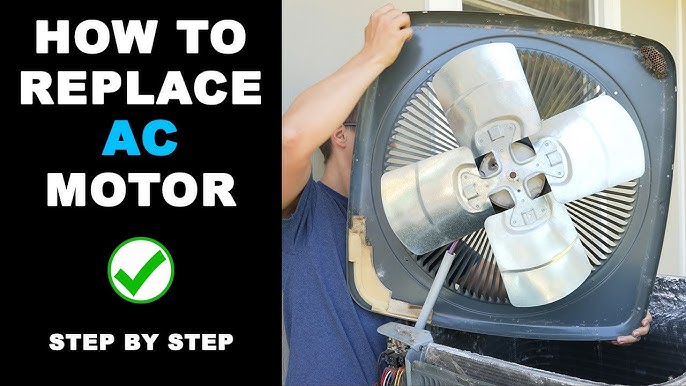
When your air conditioner kicks on, it's not just the compressor doing the work. The air conditioning fan motor plays a crucial role in circulating air, keeping your home cool and comfortable. Understanding how these motors function, the different types available, and common issues can help you maintain your AC unit and avoid costly repairs.
What is an Air Conditioning Fan Motor?
The air conditioning fan motor is responsible for driving the fan blades that move air across the condenser coils (outside unit) and the evaporator coils (inside unit). This airflow is essential for heat exchange, which is the core process of air conditioning. Without a properly functioning fan motor, your AC unit won't be able to effectively cool your space.
Types of Air Conditioning Fan Motors
There are several types of fan motors used in air conditioning systems, each with its own characteristics and applications:
- Permanent Split Capacitor (PSC) Motors: These are the most common type found in residential AC units. They are energy-efficient and reliable, making them a popular choice.
- Shaded Pole Motors: Typically used in smaller AC units or for auxiliary fans, these motors are less efficient than PSC motors but are simpler in design.
- Electronically Commutated Motors (ECMs): Also known as brushless DC motors, ECMs are highly efficient and offer variable speed capabilities. They are becoming increasingly common in newer, high-efficiency AC systems.
(Replace with an actual image of an AC fan motor)
How Air Conditioning Fan Motors Work

The basic principle of an air conditioning fan motor is to convert electrical energy into mechanical energy, which then rotates the fan blades. Here's a simplified breakdown:
- Electricity flows to the motor windings, creating a magnetic field.
- This magnetic field interacts with the rotor, causing it to spin.
- The spinning rotor turns the fan blades, generating airflow.
- In ECMs, electronic controls manage the motor's speed and efficiency.
Common Issues with Air Conditioning Fan Motors
Like any mechanical component, air conditioning fan motors can experience problems over time. Here are some common issues:
- Motor Failure: Overheating, bearing wear, and electrical issues can lead to motor failure.
- Bearing Problems: Worn or damaged bearings can cause the motor to make noise or seize up.
- Electrical Issues: Problems with wiring, capacitors, or power supply can prevent the motor from running.
- Overheating: Restricted airflow, dirt buildup, or excessive use can cause the motor to overheat and fail.

Maintenance Tips for Air Conditioning Fan Motors
Proper maintenance can extend the lifespan of your air conditioning fan motor and prevent costly repairs. Here are some tips:
- Regular Cleaning: Keep the fan blades and motor free from dirt and debris.
- Lubrication: Lubricate the motor bearings as needed, following the manufacturer's recommendations.
- Check for Loose Connections: Inspect electrical connections for tightness and signs of corrosion.
- Monitor for Unusual Noises: Pay attention to any unusual noises coming from the motor, such as squealing or grinding.
- Professional Inspection: Schedule regular maintenance checks with a qualified HVAC technician.

When to Replace Your Air Conditioning Fan Motor
If your air conditioning fan motor is showing signs of failure, it's important to address the issue promptly. Here are some indicators that it may need to be replaced:
- The fan is not spinning or spinning slowly.
- The motor is making unusual noises.
- The motor is overheating or tripping the circuit breaker.
- The AC unit is not cooling effectively.
Replacing a faulty fan motor can restore your AC unit's performance and efficiency. If you're not comfortable performing the replacement yourself, it's best to consult with a qualified HVAC technician.
Conclusion
The air conditioning fan motor is a vital component of your AC system. Understanding its function, types, and maintenance needs can help you keep your home cool and comfortable. By following the tips outlined in this guide, you can ensure that your fan motor operates efficiently and reliably for years to come.
No comments:
Post a Comment
Note: Only a member of this blog may post a comment.